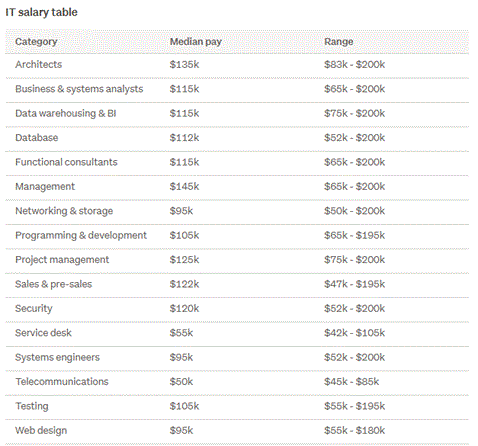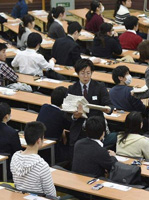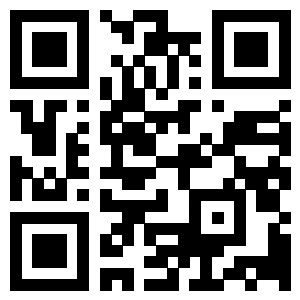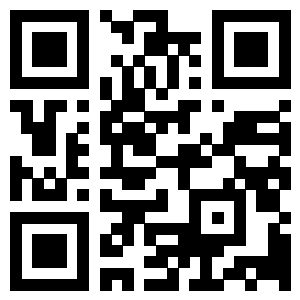2017年12月英语四级答案下载第一套
新东方在线英语四级频道考后发布2017年12月英语四级答案下载第一套,同时新东方实力师资团队将对英语四级真题答案做权威解析,免费领取【大学英语四级真题解析】课程。更多2017年12月英语四级听力真题及答案、英语四级作文真题及范文、英语四级阅读真题及答案、英语四级翻译真题及答案,请查看【2017年12月英语四级真题答案解析】专题。预祝大家高分通过大学英语四级考试!
2017年12月英语四级真题及答案大汇总 | ||
试卷 | 英语四级卷一真题答案 | 英语四级卷二真题答案 |
英语四级卷三真题答案 | 英语四级真题答案下载 | |
题型 | 英语四级作文真题答案 | 英语四级翻译真题答案 |
英语四级听力真题答案 | 英语四级阅读真题答案 | |
2017年12月大学英语四级真题答案(第一套)
新东方在线
Part I Writing (25 minutes)
Directions: For this part, you are allowed 30 minutes to write a short easy on how to best
handle the relationship between doctors and patients. You should write at least
120 words but no more than 180 words.
Part II Listening Comprehension (25 minutes)
Section A
Directions: In this section, you will hear three news reports. At the end of each news report, you will hear two or three questions. Both the news report and the questions will be spoken only once. After you hear a question, you must choose the best answer from the four choices marked A), B), C) and D). Then mark the corresponding letter on Answer Sheet 1 with a single line through the centre.
Questions 1 and 2 are based on the news report you have just heard.
1. A) Her friend Erika. C) Her grandfather.
B) Her little brother. D) Her grandmother.
2. A) By taking pictures for passers-by. C) By selling lemonade and pictures.
B) By working part time at a hospital. D) By asking for help on social media.
Questions 3 and 4 are based on the news report you have just heard.
3. A) Finding cheaper ways of highway construction.
B) Generating electric power for passing vehicles.
C) Providing clean energy to five million people.
D) Testing the efficiency of the new solar panel.
4. A) They can stand the wear and tear of natural elements.
B) They can be laid right on top of existing highways.
C) They are only about half an inch thick.
D) They are made from cheap materials.
Questions 5 to 7 are based on the news report you have just heard.
5. A) Endless fighting in the region. C) Inadequate funding for research.
B) The hazards from the desert. D) The lack of clues about the species.
6. A) To observe the wildlife in the two national parks.
B) To identify the reasons for the lions’ disappearance.
C) To study the habitat of lions in Sudan and Ethiopia.
D) To find evidence of the existence of the “lost lions”.
7. A) Lions walking. C) Some camping facilities.
B) Lions’ tracks. D) Traps set by local hunters.
Section B
Directions:In this section, you will hear two long conversations. At the end of each conversation, you will hear four questions. Both the conversation and the questions will be spoken only once. After you hear a question, you must choose the best answer from the four choices marked A), B), C), and D). Then mark the corresponding letter on Answer Sheet 1 with a single line through the centre.
Questions 8 to 11 are based on the conversation you have just heard.
8. A) Her ‘lucky birthday’. C) Her wedding anniversary.
B) A call from her dad. D) A special gift from the man.
9. A) Gave her a big model plane. C) Took her on a trip overseas.
B) Bought her a good necklace. D) Threw her a surprise party.
10. A) The gift her husband has bought.
B) The trip her husband has planned.
C) What has been troubling her husband.
D) What her husband and the man are up to.
11. A) He will be glad to be a guide for the couple’s holiday trip.
B) He will tell the women the secret if her husband agrees.
C) He is eager to learn how the couple’s holiday turns out.
D) He wants to find out about the couple’s holiday plan.
Questions 12 to 15 are based on the conversation you have just heard.
12. A) They are sensitive to the dynamics of a negotiation.
B) They see the importance of making compromises.
C) They know when to adopt a tough attitude.
D) They take the rival’s attitude into account.
13. A) They know how to adapt. C) They know when to make compromises.
B) They know when to stop. D) They know how to control their emotion.
14. A) They are patient. C) They learn quickly.
B) They are good at expression. D) They uphold their principles.
15. A) Make clear one's intentions. C) Formulate one's strategy.
B) Clarify items of negotiation. D) Get to know the other side.
Section C
Directions: In this section, you will hear three passages. At the end of each passage, you will
hear three or four questions. Both the passage and the questions will be spoken only
once. After you hear a question, you must choose the best answer from the four
choices marked A), B), C), D). Then mark the corresponding letter on Answer
Sheet 1 with a single line through the centre.
Questions 16 to 18 are based on the passage you have just heard.
16. A) When America's earliest space program started.
B) When the International Space Station was built.
C) How many space shuttle missions there will be.
D) How space research benefits people on Earth.
17. A) They accurately calculated the speed of the orbiting shuttles.
B) They developed objects for astronauts to use in outer space.
C) They tried to meet astronauts' specific requirements.
D) They tried to make best use of the latest technology.
18. A) They are extremely accurate. C) They were first made in space.
B) They are expensive to make. D) They were invented in the 1970s.
Questions 19 to 21 are based on the passage you have just heard.
19. A) It was when her ancestors came to America.
B) People had plenty of land to cultivate then.
C) It marked the beginning of something new.
D) Everything was natural and genuine then.
20. A) They believed in working for goals. C) They had all kinds of entertainment.
B) They enjoyed living a living a life of ease. D) They were known to be creative.
21. A) Chatting with her ancestors. C) Polishing all the silver work.
B) Furnishing her country house. D) Doing needlework by the fire.
Questions 22 to 25 are based on the passage you have just heard.
22. A) Use a map to identify your location. C) Sit down and try to calm yourself.
B) Call your family or friends for help. D) Try to follow your footprints back.
23. A) You may find a way out without your knowing it.
B) You may expose yourself to unexpected dangers.
C) You may get drowned in a sudden flood.
D) You may end up entering a wonderland.
24. A) Look for food. C) Start a fire.
B) Wait patiently. D) Walk uphill.
25. A) Inform somebody of your plan. C) Check the local weather.
B) Prepare enough food and drink. D) Find a map and a compass.
Part Ⅲ Reading Comprehension ( 40 minutes )
Section A
26. K superior
27. D nuisance
28. M tip
29. O visual
30. A associated
31. F preventing
32. H sensitive
33. I slight
34. C indicate
35. B examine
Section B
36. Elderly students find it hard to keep up with the rapid changes in education.
答案:I
37. Some believe take-home exams may affect students' performance in other courses.
答案:E
38. Certain professors believe in-class exams are ultimately more helpful to students.
答案:C
39. In-class exams are believed to discourage cheating in exams.
答案:D
40. The author was happy to learn she could do some exams at home.
答案:B
41. Students who put off their work until the last moment often find the exams more difficult than
they actually are.
答案:H
42. Different students may prefer different types of exams.
答案:G
43. Most professors agree whether to give an in-class or a take-home exam depends on type of
course being taught.
答案:F
44. The author dropped out of college some forty years ago.
答案:A
45. Some students think take-home exams will eat up their free time.
答案:J
Section C
Passage One
46. What did researchers find puzzling about the first-night effect?
答案:D) In what way it can be beneficial.
47. What do we learn about Dr. Yuka Sasaki doing her research?
答案:C) She got some idea from previous studies on birds and dolphins
48. What did Dr. Sasaki do when she first did her experiment?
A) She monitored the brain activity of participants sleeping in a new environment.
49. What did Dr. Sasaki do when re-running her experiment?
答案:C) She exposed her participants to two different stimuli.
50. What did Dr. Sasaki find about the participants in her experiment?
答案:B) They tended to perceive irregular beeps as a threat.
Passage Two
51. What does the author say is the problem with women?
答案:D) They tend to push themselves beyond the limits of their ability.
52. Why do working women of child-bearing age tend to feel drained of energy?
答案: A) They struggle to satisfy the demands of both work and home.
53. What may hinder the future prospects of career women?
答案:A) Their unwillingness to say “no”.
54. Men and woman differ in their approach to resolving workplace conflicts in that______.
答案:C) men tend to put their personal interests first
55. What is important to a good leader?
答案:B) The ability to delegate.
Part Ⅳ Translation
华山位于华阴市,据西安120公里。华山是秦岭的一部分,秦岭不仅分割陕南与陕北,也分隔华南与华北。与从前人们常去朝拜的泰山不同,华山过去很少有人光临,因为上山的道路极其危险。然而,希望长寿大人却经常上山,因为山上生长着许多草药,特别是一些稀有的草药。自上世纪90年代安装缆车以来,参观人数大大增加。
2017年12月大学英语四级成绩查询

2018年6月英语四级新考季课程限时85折
活动时间:12月16日-18日

扫码关注新东方在线服务号
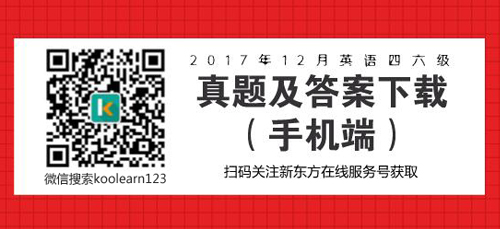
>>四级答案这里最全
- 相关阅读
TOPS
- 日排行/
- 周排行/
- 原创
- 日排行/
- 周排行/
- 原创
- 1 无锡学院2022年6月英语六级准考证打印入口|时间:6月1日
- 2 2022年6月英语四级作文热门话题及范文:教育不公平
- 3 泰州学院2022年6月英语六级准考证打印入口|时间:6月1日
- 4 吉林四级考试时间2022年上半年
- 5 2022年6月英语四级作文热门话题及范文:网络游戏
- 6 宿迁学院2022年6月英语六级准考证打印入口|时间:6月1日
- 7 2022年6月英语四级作文热门话题及范文:电力短缺
- 8 苏州城市学院2022年6月英语六级准考证打印入口|时间:6月1日
- 9 2022年6月英语四级作文热门话题及范文:手机的利弊
- 10 常熟理工学院2022年6月英语六级准考证打印入口|时间:6月1日

